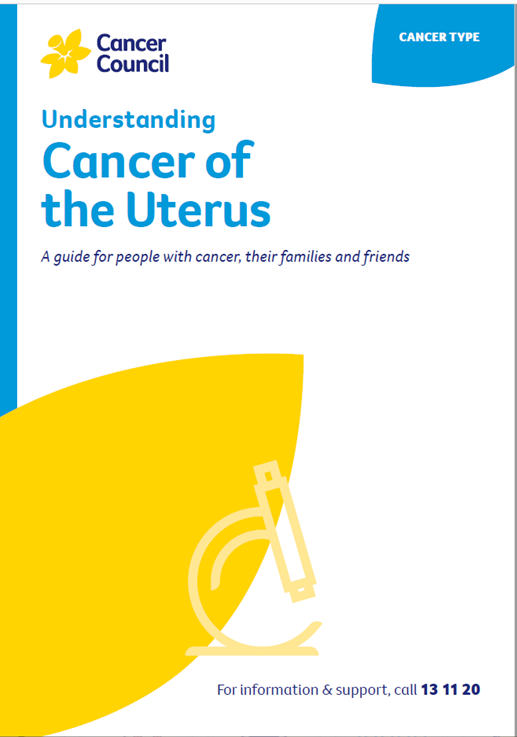- Home
- Cancer of the uterus
- Managing side effects
- Bladder changes
Bladder changes
Treatment for cancer of the uterus can cause bladder problems. Most
bladder side effects are temporary or can be managed. Talk to your
treatment team for more information.
Learn more about:
Urinary incontinence
This is when you have trouble controlling your bladder and you leak urine (wee). Strengthening the pelvic floor muscles can help control the flow of urine. A women’s health physiotherapist or continence nurse can develop a bladder training program – ask your doctor for a referral or contact the National Continence Helpline on 1800 33 00 66.
The pelvic floor muscles control the flow of urine, so strengthening them can help manage urinary incontinence. See more on exercising the pelvic floor muscles. Using continence pads or special types of absorbent underwear can help you manage leakage.
For more on this, see Exercise during cancer treatment.
If you are have ongoing incontinence, you may be eligible for subsidised incontinence products through the continence payment scheme. For details, visit servicesaustralia.gov.au/continence-aids-payment-scheme.
Radiation cystitis
Radiation therapy can irritate the lining of the bladder. You may feel like you want to pass urine often or have a burning sensation when you pass urine. Called radiation cystitis, it usually gets better after treatment. Try to drink plenty of water or use a urinary alkaliser (e.g. Ural) to help reduce the burning sensation. You can buy urinary alkalisers from your pharmacy. Your doctor may also prescribe medicine to treat cystitis.
Blood in urine
The blood vessels in the bladder can become more fragile after radiation therapy. This can cause blood to appear in your urine, even months or years after treatment. Always let your doctor know if you notice new or unusual bleeding.
Podcast: Managing Cancer Pain
Listen to more episodes from our podcast for people affected by cancer
More resources
A/Prof Orla McNally, Consultant Gynaecological Oncologist, Director Oncology/Dysplasia, Royal Women’s Hospital, Honorary Clinical Associate Professor, University of Melbourne, and Director of Gynaecology Tumour Stream, Victorian Comprehensive Cancer Centre, VIC; A/Prof Yoland Antill, Medical Oncologist, Peninsula Health, Parkville Familial Cancer Centre, Cabrini Health and Monash University, VIC; Grace Guerzoni, Consumer; Zeina Hayes, 13 11 20 Consultant, Cancer Council Victoria; Bronwyn Jennings, Gynaecology Oncology Clinical Nurse Consultant, Mater Hospital Brisbane, QLD; A/Prof Christopher Milross, Director of Mission and Radiation Oncologist, Chris O’Brien Lifehouse, NSW; Mariad O’Gorman, Clinical Psychologist, Liverpool Cancer Therapy Centre and Bankstown Cancer Centre, NSW.
View the Cancer Council NSW editorial policy.
View all publications or call 13 11 20 for free printed copies.
Need to talk?
Support services
Life after cancer treatment
Webinars, exercise and nutrition, sexuality programs, and back-to-work support
Need legal and financial assistance?
Pro bono services, financial and legal assistance, and no interest loans
Cancer information
Exercise and cancer
Learn exercise routines that can benefit you during and after cancer treatment
Relaxation and meditation
Learn how relaxation and meditation can help you both during and after cancer treatment

